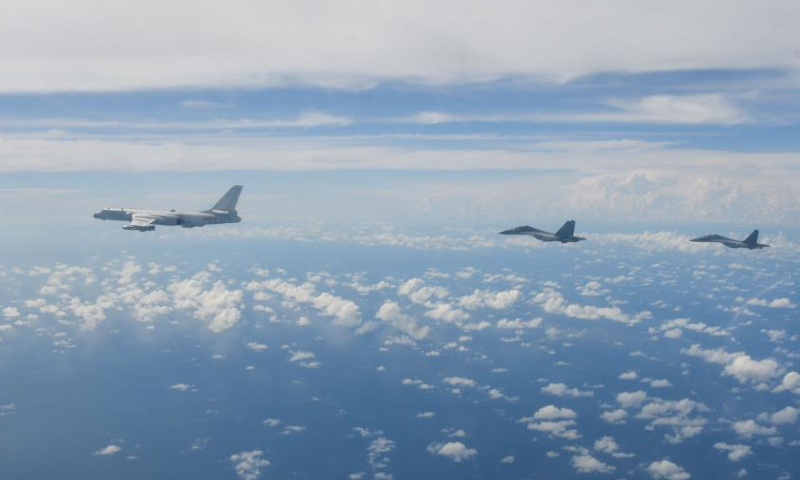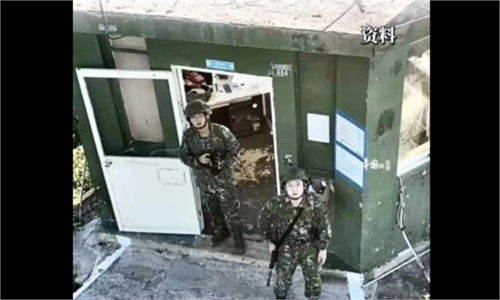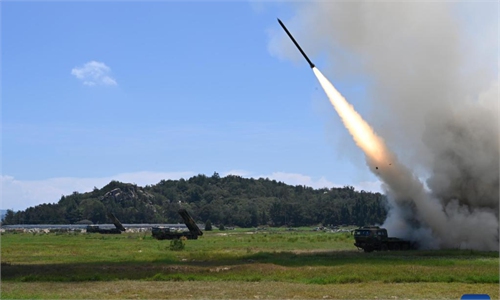US plans missile sales to Taiwan in ‘escalation of provocation’ after Pelosi visit; ‘drains every last drop of blood from island before reunification’
Drain every last drop of blood from island before reunification, can't shake PLA's absolute advantage

Warplanes of the Eastern Theater Command of the Chinese People's Liberation Army (PLA) conduct operations during joint combat training exercises around the Taiwan Island, Aug. 7, 2022. The Eastern Theater Command continued its joint combat training exercises as scheduled on Sunday in the waters and airspace around the Taiwan Island. Photo: Xinhua
The US is reportedly planning to sell an arms package involving anti-ship and air-to-air missiles worth $1.1 billion to the island of Taiwan only weeks after US House Speaker Nancy Pelosi's provocative visit to the island, a move analysts said on Tuesday is yet another ill-intended provocation that will only escalate tensions.
The arms sales will be futile in changing the absolute superiority of the Chinese People's Liberation Army (PLA) over Taiwan's armed forces and the PLA will be more than ready to deal with them, experts said.
The Biden administration plans to formally ask Congress to approve an estimated $1.1 billion arms sale to Taiwan, US news outlet Politico reported on Monday, citing sources with direct knowledge of the package.
The package will provisionally include 60 AGM-84L Harpoon Block II anti-ship missiles for $355 million, 100 AIM-9X Block II Sidewinder tactical air-to-air missiles for $85.6 million, and $655.4 million for a surveillance radar contract extension, the sources said, according to the report.
In an interview with Russian media outlet Sputnik on Monday, spokesperson of the Chinese Embassy in the US Liu Pengyu said that US arms sales to Taiwan seriously violate the one-China principle, encourage Taiwan secessionists and escalate tensions across the Taiwan Straits. He stressed that China will continue to take strong and effective measures to resolutely defend its sovereignty and security interests.
The Harpoon is a type of anti-ship missile that targets warships, the Sidewinder air-to-air missile targets warplanes, and the surveillance radar detects missiles, military experts said.
Despite their potential threats, the US weapons will not change the military power balance across the Taiwan Straits as the PLA has an absolute advantage, as the launchers of the Harpoon missiles, the F-16 fighter jets that carry the Sidewinder missiles and the surveillance radar will be among the first targets of the PLA, analysts said.
Satellites, large reconnaissance aircraft and reconnaissance drones will spot those targets on the ground immediately when they are deployed, which will be followed by precision strikes. Taiwan's F-16 fighters are also no rival to the Chinese mainland's more powerful J-16 and J-20 fighter jets, analysts said.
Porcupine with longer spines
The mainland has launched strong countermeasures against Pelosi's visit. Washington probably believes that something must be done to placate Taiwan authorities and appease pro-Taiwan hawks at home, Xin Qiang, director of the Taiwan studies center with the Fudan University told the Global Times.
With the military power gap between the two sides of Straits widening, both the US and Taiwan authorities have a greater sense of urgency to strengthen the building of asymmetric warfare capabilities and turn the island into a porcupine that is hard to bite, Xin said.
In terms of the reported arms sale, the US is trying to make the porcupine's spines longer, said Lü Xiang, an expert on US studies at the Chinese Academy of Social Sciences, noting that the reported sale of offensive weapons like the Harpoon and Sidewinder is an escalation of provocations against Beijing.
The US knows that whatever weapons it sells to Taiwan island will not be able to withstand the PLA if there is a military operation, and their posture is actually to hope that the island could conduct a war of attrition against the mainland, Lü said.
However, in the event of a military conflict across the Taiwan Straits, the mainland's actions would be thunderous and would not give the island any chance to counterattack, deplete or stall for reinforcements, the expert added.
The Biden administration has so far approved five arms sales to Taiwan island since August 2021. The four most recent arms sales averaged $100 million and mostly involved technical assistance, far smaller in scale than those under the Trump administration.
Experts said that US arms sales to Taiwan under the Biden administration are expected to be strengthened in the future around developing the island's asymmetric capabilities. Because according to US domestic political practice, the military-industrial complex always lobbies the government with great efforts, and every administration has to offer something in return.
"The US weapons sale is actually a form of economic blackmail, with Taiwan often receiving weapons from the US at prices much higher than the actual prices," Lü said, "Washington wants to drain every last drop of blood from the island before reunification."
What and who to fight for
With the planned purchase of Harpoon and Sidewinder missiles from the US, analysts believe that it will be necessary for the island to create several new mobile squadrons. Taiwan media said that the island's main battle force personnel demand will peak in 2026, and the air force and navy are planning to expand. In response to the cross-Straits situational changes, the region's defense authorities also plan to rapidly increase the number of units for shore-based missile detachments.
However, about a week before the US disclosed the new arms sale to media, Taiwan-based news outlets reported that the main battle force on the island is depleted, with the total number of non-commissioned officers and junior, middle and captain-rank officers significantly short of 25,000.
According to local media udn.com, recruitment is facing difficulties. About 70 percent or more of the main battle forces, marine corps and air defense and missile command failed to meet the standard of at least 90 percent staffing ratio. Besides, more than 90 percent of the main battle ships of the island's navy failed to reach the requirement, with many of the main battle forces' staffing ratio even lower than 70 percent.
Although the latest poll on the island after Pelosi's visit showed that around 53 percent of respondents would be willing to "fight for Taiwan" if reunification by force occurs, 56.2 percent of respondents believed that the US won't defend Taiwan if reunification operations take place, according to media reports in August.
Another poll in June showed that more than half of Taiwan residents believe the island would not survive 100 days in a war with the mainland, media reported.
Some Taiwan-based experts told the Global Times that the dilemma of Taiwan's military is more convincing than easily manipulated polls. In fact, after the escalation of tensions across the Straits, the island's army was too tired to cope. Since Tsai Ing-wen took office, the island's military has suffered 20 accidents in the past six years, resulting in 28 deaths, Taiwan media reported.
Although instigated by the Democratic Progressive Party, there are some anti-mainland voices on the island, but more people understand that resistance is to die in vain, Chang Ya-chung, president of the Sun Yat-sen School in Taiwan and a member of Taiwan's major opposition party KMT, told the Global Times on Tuesday.
For young people yearning for an easy life, the tragic results of fighting the powerful PLA are not hard to predict.
Society on the island is highly divided, secessionists may believe in "fight for Taiwan," but for the other half who support reunification, the answer of what and who to fight for would be completely different, Chang said.
Given that the Taiwan question is China's internal affairs, many people in Taiwan may think that if reunification finally comes, what are we resisting for, and why should we be pawns of the US and secessionists when we can win peace from war, the expert said.




